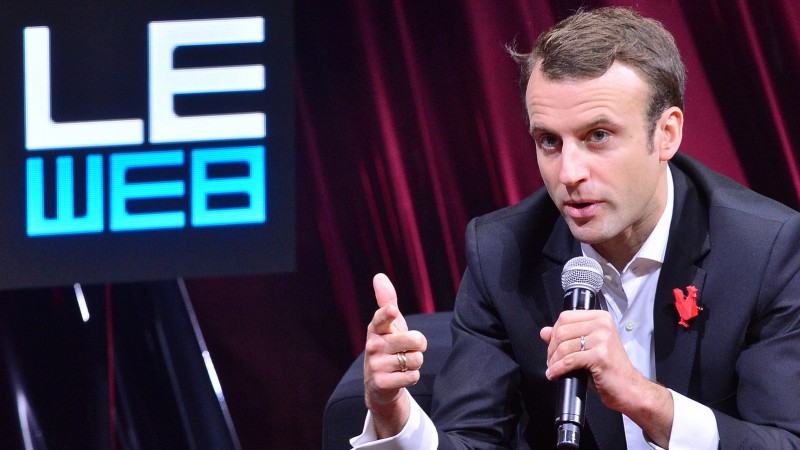What a week. The axis of global politics tilted slightly in favour of climate action, while Climate Home brought you scoops from Bonn and the tiny Amazon settlement of Taquarussu do Norte.
Internationalists everywhere cheered as Emmanuel Macron won the French presidency, scoring two thirds of the vote against the far right’s Marine Le Pen.
Macron affirmed a commitment to climate cooperation in his short victory speech and first phone calls with the presidents of China and the US.
His cheeky video message inviting beleaguered American climate scientists to bring their innovation to France, dating from February, got a revival.
Note that he will need to get a parliamentary mandate next month to put his policies, which include a coal exit by 2022, into practice.
Arctic thawing
In rapidly warming Alaska, even ExxonMobil-boss-turned-US-chief-diplomat Rex Tillerson could not deny human influence on the climate.
He signed up to an Arctic Council declaration endorsing global action to cut greenhouse gas emissions. Ok, so it said nothing about the US commitment to the Paris Agreement, which president Donald Trump is steadily undermining. Still, it represented the strongest international statement yet from the Trump administration on climate change, suggesting that diplomacy is having some effect.
Retreating sea ice at the north pole clears the way for oil exploration. For all Trump’s eagerness to drill, baby, drill, it is self-described green leader Norway making the biggest inroads into Arctic oilfields. Statoil is opening up new Barents Sea wells this month.
Amazon slaughter
Our Brazilian correspondent Fabiano Maisonnave was the first reporter on the scene of the country’s worst land-related mass murder in decades.
Nine men were shot and stabbed to death by rivals deep in the Amazon rainforest, where illegal deforestation and conflict go hand in hand. Essential reading.
Bonn bulletin
Karl Mathiesen has been in Bonn, where a much reduced US negotiating team is in listen-only mode at interim climate talks.
Negotiators rallied in defence of climate science funding, after the UN Framework Convention on Climate Change proposed to stop contributing to the Intergovernmental Panel on Climate Change. Trump is threatening to cut off US payments to both bodies.
On the sidelines, delegates warned that US withdrawal from the Paris Agreement would weaken its diplomatic standing in other forums like the G7 and G20. Uncertainty continues, with the White House deferring a decision until after this month’s G7 leaders’ summit.
A row over the Africa Renewable Energy Initiative continued, with African and German officials rejecting allegations Europeans hijacked the process. As exclusively revealed by Climate Home, the initiative’s top official resigned in protest at perceived interference from donor countries. More to come on this.
Legal fudge
Advocates of climate action hedged around the question of whether the US could weaken its emissions target and stay in the Paris Agreement. Many are advising that it can, appearing to reason it is better to keep the US at the table with a lesser commitment than lose the world’s second biggest emitter.
Irish climate policy expert Joseph Curtin has no patience with such equivocation. Participation in climate talks should not be reduced to a “branding and lobbying opportunity,” he argues. “It may be better for the US to leave now, and re-join when it is ready to behave like a responsible global citizen.”
Biniaz out
One person who was key to shaping the Paris Agreement in the US interest, Susan Biniaz, evidently didn’t fancy sticking around to renegotiate it for Trump. She joins former colleague Pete Ogden at the UN Foundation, as a senior fellow.
Solar railways
Solar panels and LEDs are bringing clean lighting to dark corners of Indian train stations, Manipadma Jena reported from Visakhapatnam. It makes passengers and homeless migrants who sleep on the platforms feel safe, as well as contributing to environmental goals.
At a UN energy forum in Vienna, India energy minister Piyush Goyal reaffirmed his commitment to the country’s Paris pledge, “irrespective of what happens in the rest of the world”.
Best of the rest
South Korea’s new president Moon Jae-in is seen as good news for the climate, reported Carbon Pulse ($).
Carbon Brief mapped the world’s 1,200 climate laws, drawing on a database from the Grantham Research Institute and Sabin Center on Climate Change Law.
China Dialogue considered the environmental implications of China’s “belt and road” overseas investment strategy, ahead of a summit 14-15 May.
Climate change is high on the agenda for an EU-China summit in Brussels on 2 June, reported Reuters.
